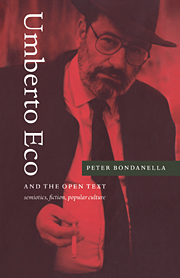Book contents
- Frontmatter
- Contents
- Preface
- ONE Umberto Eco's intellectual origins: medieval aesthetics, publishing, and mass media
- TWO The Open Work, Misreadings, and modernist aesthetics
- THREE Cultural theory and popular culture: from structuralism to semiotics
- FOUR From semiotics to narrative theory in a decade of radical social change
- FIVE “To make truth laugh”: postmodern theory and practice in The Name of the Rose
- SIX Interpretation, overinterpretation, paranoid interpretation, and Foucault's Pendulum
- SEVEN Inferential strolls and narrative shipwrecks: Six Walks and The Island of the Day Before
- EIGHT Conclusion
- Bibliography
- Index
ONE - Umberto Eco's intellectual origins: medieval aesthetics, publishing, and mass media
Published online by Cambridge University Press: 23 October 2009
- Frontmatter
- Contents
- Preface
- ONE Umberto Eco's intellectual origins: medieval aesthetics, publishing, and mass media
- TWO The Open Work, Misreadings, and modernist aesthetics
- THREE Cultural theory and popular culture: from structuralism to semiotics
- FOUR From semiotics to narrative theory in a decade of radical social change
- FIVE “To make truth laugh”: postmodern theory and practice in The Name of the Rose
- SIX Interpretation, overinterpretation, paranoid interpretation, and Foucault's Pendulum
- SEVEN Inferential strolls and narrative shipwrecks: Six Walks and The Island of the Day Before
- EIGHT Conclusion
- Bibliography
- Index
Summary
Umberto Eco was born on 5 January 1932 in the city of Alessandria in the Piedmont region of Italy. Alessandria in the nineteenth century had become best known for the location of the most important factory of the Borsalino company, Italy's premier maker of hats. According to the accounts of his childhood that have come down to us after he reached international fame (accounts, therefore, which may be somewhat tinged by hagiography), Eco was a precocious young student who excelled in cartoons, parodies, and intellectual games. Apparently he composed a parody of Dante in hendecasyllabic verse entitled Ladiacqua commedia (The Divine Water Comedy), purporting to narrate events in his family as if he were the sommo poeta. After completing his maturità classica at the Liceo Plana, Eco began his university education, enrolling at the University of Turin, where he completed his degree in philosophy with Professor Luigi Pareyson in 1954.
Even before the publication of his thesis, however, Umberto Eco had begun to make a name for himself, even if not initially in the fields of cultural and literary theory. In 1951, a young man named Mario Rossi was elected president of the Gioventù Italiana di Azione Cattolica (the GIAC), the youth group of the Catholic Church. At this early stage in his life, Eco was a militant Catholic intellectual, working closely with a man and a movement attempting to transcend the heavily conservative religious, social, and cultural policies represented by the then reigning pontiff, Pius XII. Eco worked with Rossi in Rome, writing for Gioventù cattolica (the publication of GIAC) and attempting to push the church into the direction that would reflect the more liberal policies of the French clergy of the period.
- Type
- Chapter
- Information
- Umberto Eco and the Open TextSemiotics, Fiction, Popular Culture, pp. 1 - 18Publisher: Cambridge University PressPrint publication year: 1997



